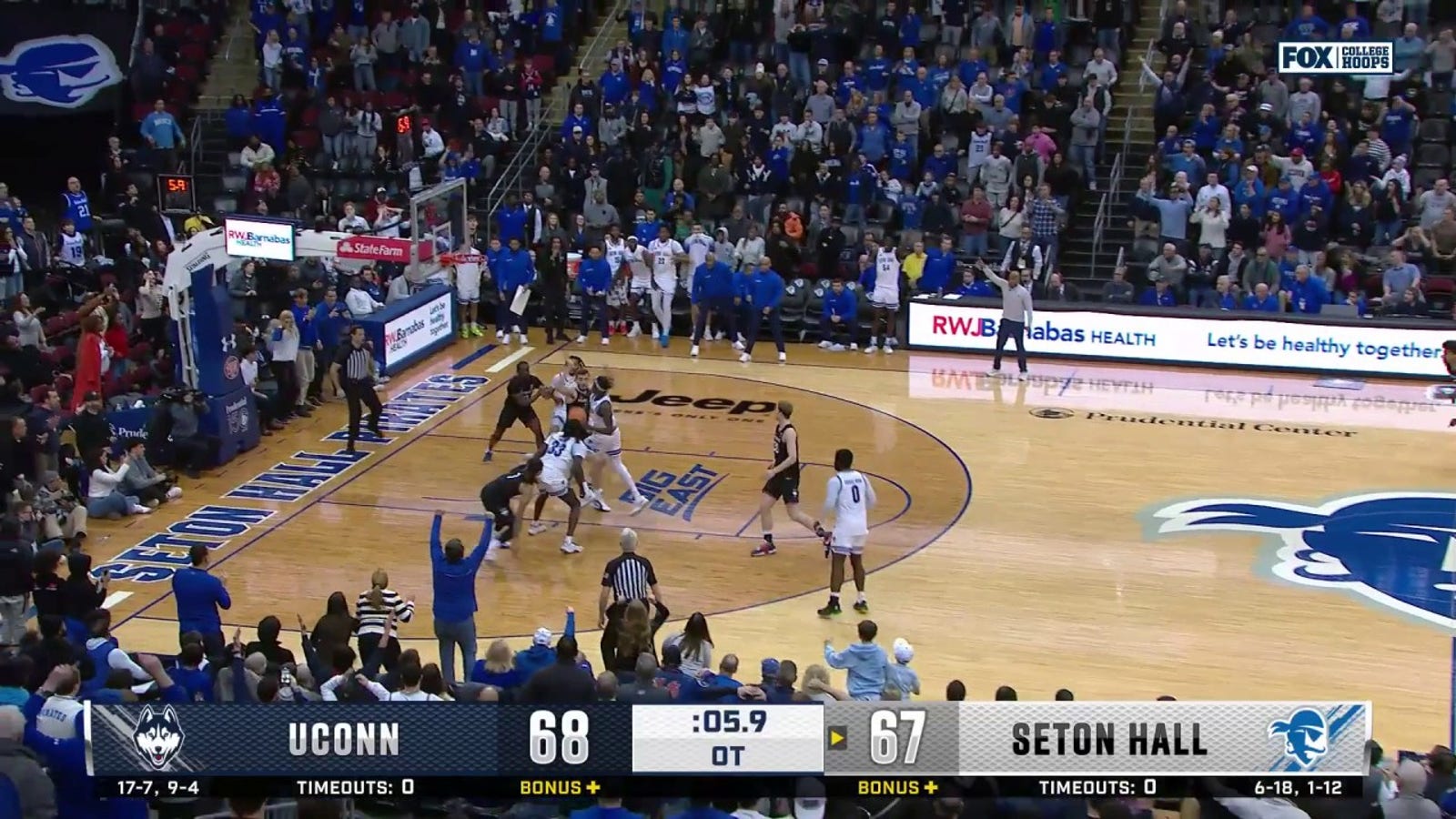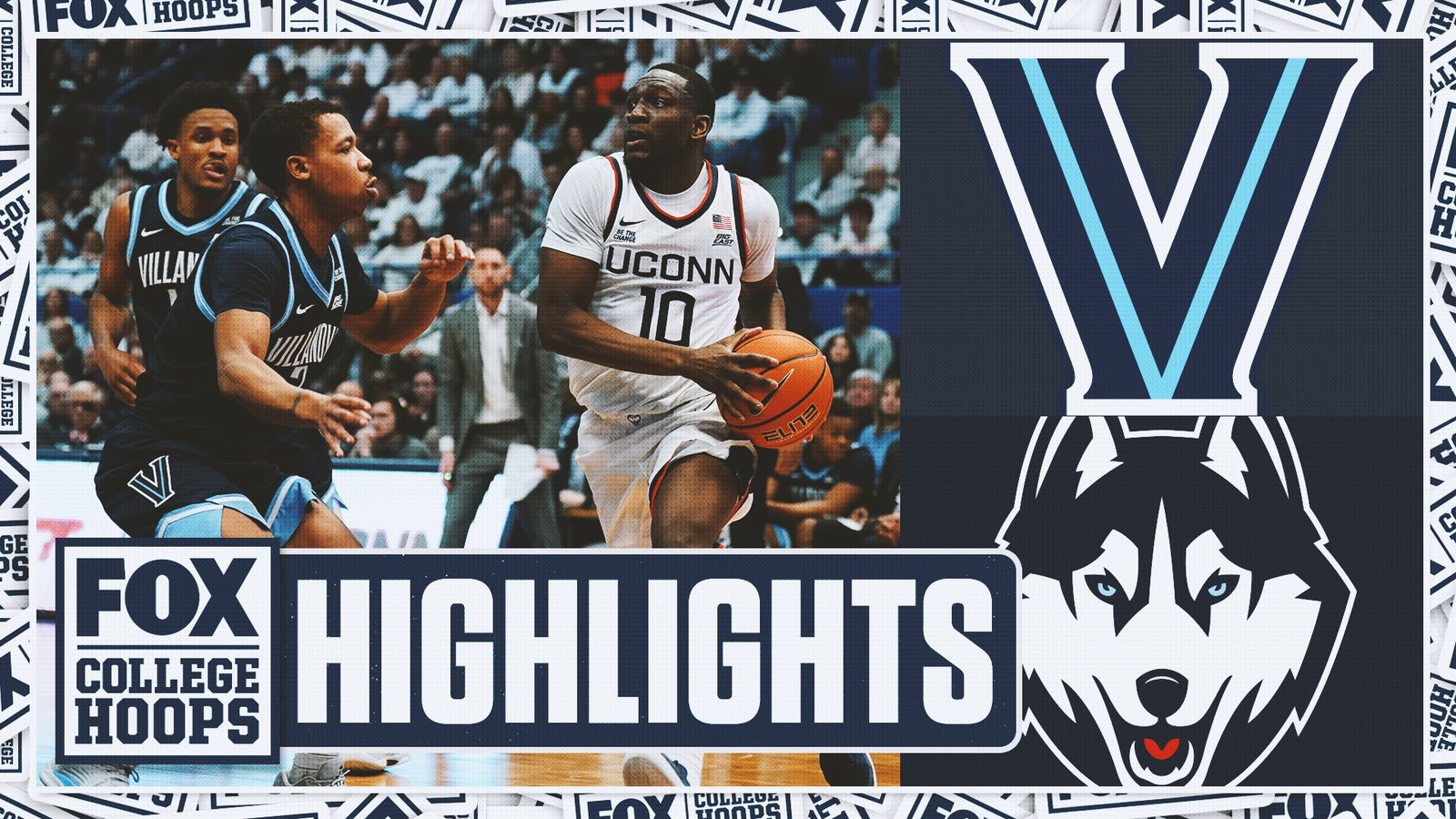HARTFORD, Conn. — In the days following UConn‘s calamitous and catastrophic loss to Seton Hall on Saturday, some familiar faces wandered into the team’s practice facility. One belonged to Donovan Clingan, the 7-foot-2, 280-pound Goliath who anchored head coach Dan Hurley’s schematic designs on both ends of the floor during a storied two-year collegiate career. Another belonged to Tristen Newton, the long-limbed transfer from East Carolina who blossomed into a consensus first-team All-American for Hurley and was subsequently inducted into the Huskies of Honor. Both players were instrumental in Connecticut winning back-to-back national championships.
Their return to campus was enabled by the fortuitously timed NBA All-Star break that happened to coincide with UConn’s nadir: a lowly three-day turnaround from one of the most galling defeats in recent memory to a must-win clash against Villanova, with the Huskies’ season effectively hanging in the balance. Never had Hurley and his team, which tumbled out of the AP Poll last week, been farther from their stated goal of authoring college basketball’s first three-peat since UCLA in the early 1970s than the sullen bus ride home from New Jersey that Hurley described as being like “a casket with wheels.” At that moment, none of them knew if UConn would even qualify for the NCAA Tournament barring another magical run through March.
But spending time with Clingan and Newton helped lift the spirits of a coaching staff that has been desperately searching for ways to cure its flawed roster. And while neither player could suit up for the Huskies themselves — though Hurley would have certainly loved it — their presence was a reminder of both the heights this program has reached and the standards its greatest players have set. Newton and former teammate Cam Spencer, another member of last year’s national title-winning squad, both received standing ovations from an XL Center crowd of 15,684 when they sat courtside for Tuesday night’s game, an arm’s length from the Connecticut bench.
“I think it gave us a lift of energy,” point guard Hassan Diarra said. “It’s been a tough couple days. Seeing those guys, seeing those champions, that championship DNA, it just gave us a little bit more confidence of remembering who the Huskies are and what we do. And we showed that in those last 12 minutes.”
ADVERTISEMENT
Trailing by 14 points with 11:58 remaining after a soaring baseline dunk from Villanova guard Wooga Poplar, whom Hurley described as a future first-round pick, the Huskies barreled away from the brink with an incredible 27-6 run that offered glimpses of everything the coaches believed this team could be. There was pressure-cooking defense and soul-snatching rebounding, high-level playmaking and icy-veined free-throw shooting. A fan base spoiled by one lopsided drubbing after another the last two seasons swiftly rallied behind an undermanned team hellbent on snatching victory from the jaws of defeat, allowing an entire state to believe in what might be possible for at least a few weeks longer. The final score read UConn 66, Villanova 59 in reflection of an escape that kept the Huskies afloat.
“My f—ing Oura Ring was ready to explode,” Hurley said of the device he wears for tracking things like heart rate and activity level.
In some respects, Hurley’s remark can be attributed to the prolonged roller coaster his team has ridden since Jan. 29, when UConn trailed hapless DePaul by 14 points in this same building before rallying to a double-digit win. The effort needed to avoid an upset against the Blue Demons kickstarted a grueling league stretch that taxed Hurley’s team emotionally and physically alike: from a gritty road win at then-No. 9 Marquette without star freshman Liam McNeeley to a turnover-riddled home loss against then-No. 12 St. John’s; from an intense road victory against then-No. 24 Creighton to the comedy of errors at Seton Hall. How exactly the Huskies would respond against Villanova, another desperate Big East foe, was anyone’s guess on a frigid and windswept weeknight with an early 6:30 p.m. ET tipoff, even if the home team was favored by more than eight points.
Coming to grips with why UConn was in this position means probing the original vision for the current roster after two years of flawless talent identification and personnel management. There were inklings of potential misfires as early as November, not even a month into the regular season, when the Huskies endured a stunning three-game losing streak at the Maui Invitational, culminating with a blowout loss against unranked Dayton. It was clear then that fouling would be a lingering issue for centers Samson Johnson (6.2 per 40 minutes) and Michigan transfer Tarris Reed Jr. (5.5 per 40 minutes), a negative habit compounded by the limited development from sophomore Youssouf Singare, the only other true big man on the roster. It was apparent that Saint Mary’s transfer Aidan Mahaney, the team’s projected starter at point guard, would struggle with his undersized frame and uneven decision-making against better competition, torpedoing the staff’s vision for a potential rotation. All of those things ascribed bulging workloads to players like Alex Karaban (36 minutes per game), Solo Ball (32 minutes per game), McNeeley (31 minutes per game) and Diarra (27 minutes per game), who would eventually be forced to play through patellar tendonitis. That sophomores Jaylin Stewart (5.9 points per game) and Jayden Ross (3 points per game) are progressing slower than Hurley expected further compounded the problem.
“The difference between this year’s team and the prior teams is we were just so deep [the last two seasons],” Hurley said after Tuesday’s game. “I mean, we were so deep, so we were pretty fresh. Our high-end people weren’t playing the minutes that our high-end people are playing [right now]. So we could practice hard in preparation for games and be super sharp.
“Whereas [now] it’s like we’ve gotta back off because of Liam’s injury, because of Hassan’s injury, because of Alex’s minutes and because of the general, you know, lack of how far we can go into the bench in this given year. Practice is so important to us to get us razor sharp and get us playing at a fever pitch when games start. Not being able to practice the way we like to practice has hurt the way we’ve played this year.”
And never more so than over the weekend against Seton Hall, which became the first team to beat UConn when entering with six or fewer victories through the first 24-plus games in a season since at least 1995-96, according to FOX Sports Research. The weight of Hurley’s bewilderment and bemusement, his humiliation and cracked hubris, collapsed onto an elbow slung atop the table from which he conducted an especially brief postgame news conference inside the Prudential Center, as the palm of his right hand was responsible for both supporting his head and masking his bleary eyes. Had his Huskies really just blown a seven-point lead with :45 remaining in regulation against what is arguably the Big East’s worst team? Had they actually squandered another five-point advantage in the final 59 seconds of overtime? For a coach as ensconced in cutting-edge schemes and forward-thinking analytics as Hurley, who demands graduate-level execution from his players, the sheer juvenility of UConn’s implosion three days ago was arresting.
“I didn’t even know what I could possibly say in here,” Hurley told reporters after Saturday’s loss, “just based on the overall performance and just the ‘Keystone Cops’ s— that went on at the end of regulation and the end of overtime.”
The incredulity of it all prompted Hurley to openly question the quality of his coaching for the second time in as many weeks, having already spent the early days of February anguishing over the Huskies’ gargantuan turnover tallies against Marquette (25 TOs, win) and St. John’s (22 TOs, loss). In between those two games and Saturday’s meltdown at Seton Hall was an electrifying 38-point tour de force from McNeeley at Creighton, a Herculean effort that inspired hope by papering over some of the team’s deficiencies with lottery pick-caliber talent. Then came the loss to Seton Hall, which was ripe with teaching points “similar to some other clips that have happened throughout the year,” Hurley said, later acknowledging that it feels like “we’re watching some of the same movies” during film sessions.
[Related: Liam McNeely’s individual brilliance could help solve UConn’s point guard dilemma]
The dynamics felt even more strained when Karaban told reporters that “players don’t take every game seriously and don’t treat every game [like] life or death the way that the coaching staff does.” And Hurley seemed to echo that sentiment during a particularly sobering media session on Monday in which he explained that UConn, like many programs, is battling a modern college basketball landscape wherein frustrated athletes might be “going one foot out the door or disconnecting themselves from the group,” given how easy it is to transfer. He implored the players to remain steadfast and do their jobs.
“I’d love to walk into a locker room and have to maybe break up a fight between two players that are pissed off that maybe [someone] didn’t play hard enough,” Hurley said earlier this week. “I think I’m probably disappointed that I haven’t walked into more frustrated, angry locker rooms throughout the year for us.”
Any pent-up frustration his players had finally surfaced in the final 12 minutes against Villanova, during a snarling display of toughness and tenacity that prompted Hurley and his assistant coaches to roar with approval. They reveled in the snatching rebound and putback from Stewart that cut the deficit to six; the one-handed catch and layup by Reed (13 points) that knotted the score at 58-58; the nine steely free throws from McNeeley (20 points) without a miss; the gutsy charge drawn by Diarra; the waves of defensive pressure that forced the Wildcats to miss 13 of their final 15 field goal attempts until the clock eventually ran out.
“We’ve got to play with desperation,” McNeeley said. “I think that’s what we did in those last 12 minutes. I mean, before that, we were not putting together a good game. We’ve got to play like that all game, every game, for the rest of this season.”
Just like Clingan, Newton and Spencer did before them.
Michael Cohen covers college football and basketball for FOX Sports with an emphasis on the Big Ten. Follow him on Twitter @Michael_Cohen13.
Want great stories delivered right to your inbox? Create or log in to your FOX Sports account, follow leagues, teams and players to receive a personalized newsletter daily!
recommended

Get more from College Basketball Follow your favorites to get information about games, news and more



